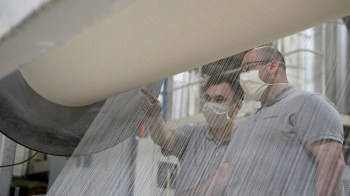U.S. retailers see fallout from Bangladesh factory fire
A growing number of U.S. Companies — including Wal-Mart, Sears, Disney, Dickies and hip-hop star Sean Comb’s clothing line — have been linked to the deadly garment factory fire in Bangladesh over the weekend, which killed more than 100 people. Today three managers at Tazreen Fashions, the factory where the fire broke out, were arrested, suspected of locking in the workers who died after fire alarms went off. It’s a horrific tragedy that could also have implications for the U.S. clothing industry.
Retail industry analyst Burt Flickinger and his team at Strategic Resource Group have already noticed one piece of possible fallout. Over the last week, they happened to be out in stores across the country, tallying holiday shoppers. On Monday, after news came out that piles of Wal-Mart’s “Faded Glory,” brand shorts had been found among the ashes of the factory fire, they saw a change shopping traffic at company’s stores.
“Customer counts in the apparel sections have been very weak,” over the last few days, he says.
He thinks at least part of the weak numbers come from a drop in shoppers, troubled by news of the fire and conditions in the factory. “Particularly women and students,” he says, who “can make up to 80 percent of purchase decisions on apparel and accessories.”
Since the fire, Wal-Mart and Sears have both put distance between their companies and Tazreen Factory, which had a record of fire safety hazards. Wal-Mart issued a public statement expressing concern for the fire victims, saying it had cut ties with the factory months earlier, but a subcontractor sent work there anyway without their knowledge. Wal-Mart announced on Tuesday that they were immediately terminating the relationship with that subcontractor.
Sears also issued a statement expressing concern for the victims, saying Sears “does not source from this factory.” But a a journalist with the Associated Press reported Wednesday that he found entries in account books amid the ashes indicating the factory took orders for Sears.
Judy Gearhart, executive director of the International Labor Rights Forum, which advocates for safer conditions in overseas factories, says that supply chains in the garment industry can be complicated and hard to track. But she says situations where unsafe, unauthorized factories are producing things for U.S. companies could be minimized with reforms. If factory workers were given more of a voice in monitoring their own conditions, then “Wal-Mart would have known that there was a factory making a product that was unapproved. “Workers can tell you that,” she says.
Bangladesh is the world’s biggest exporter of clothing after China. As Chinese wages rise, more U.S. companies have turned to Bangladesh, where factory workers are among the world’s lowest paid. At least 500 people have died in garment factory accidents in Bangladesh since 2006.
There’s a lot happening in the world. Through it all, Marketplace is here for you.
You rely on Marketplace to break down the world’s events and tell you how it affects you in a fact-based, approachable way. We rely on your financial support to keep making that possible.
Your donation today powers the independent journalism that you rely on. For just $5/month, you can help sustain Marketplace so we can keep reporting on the things that matter to you.


















